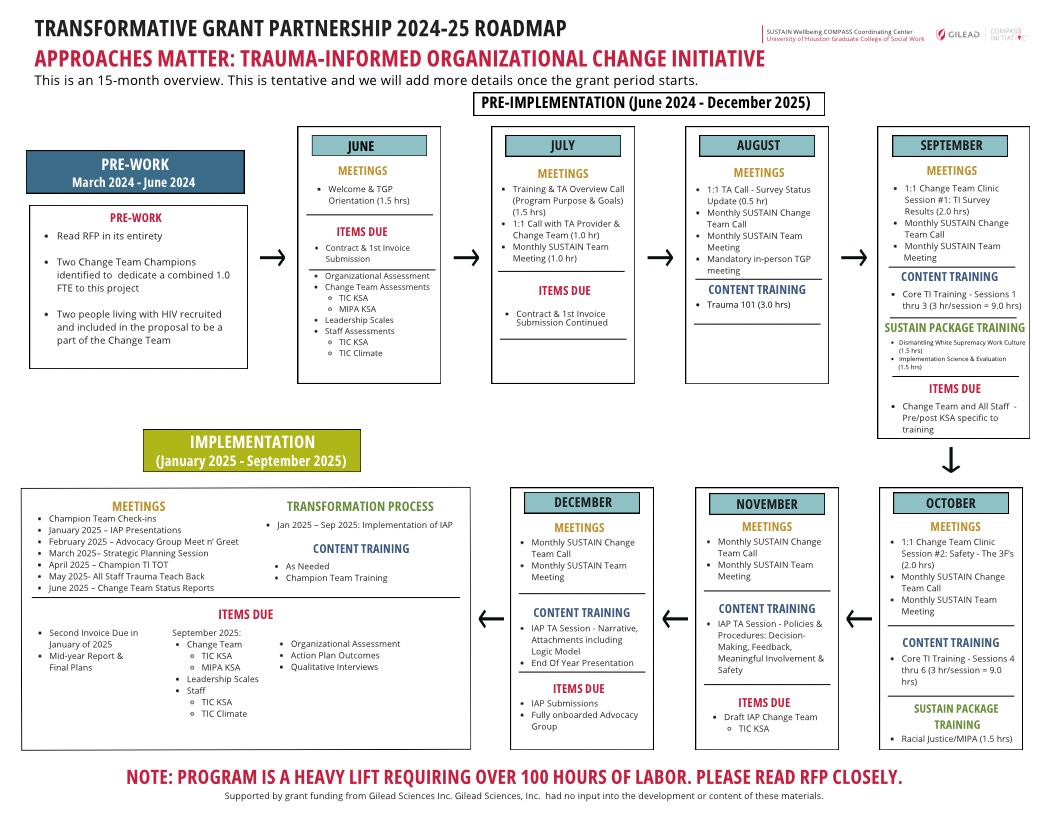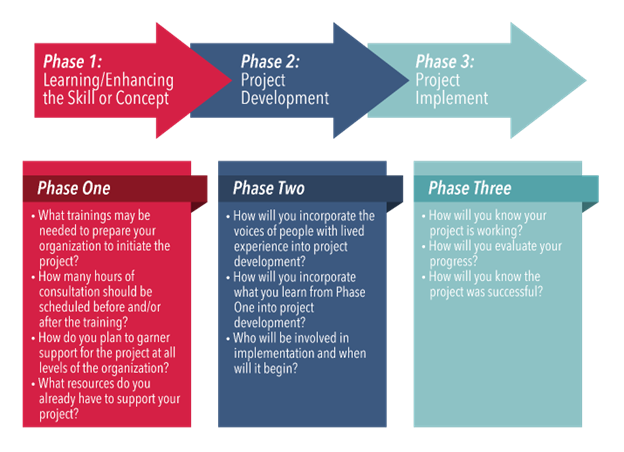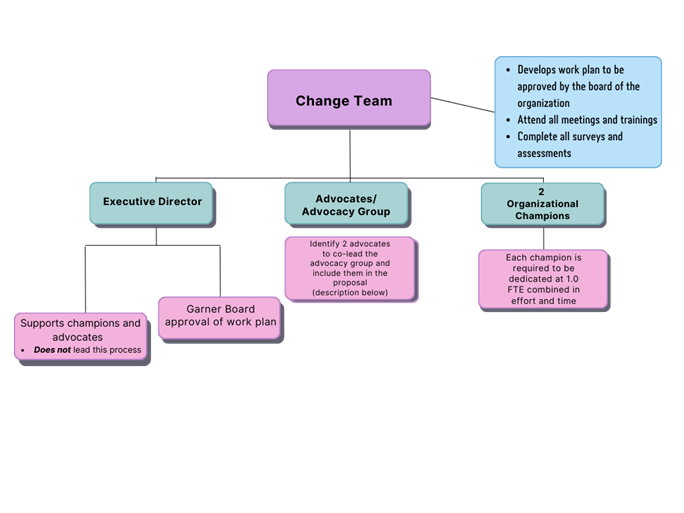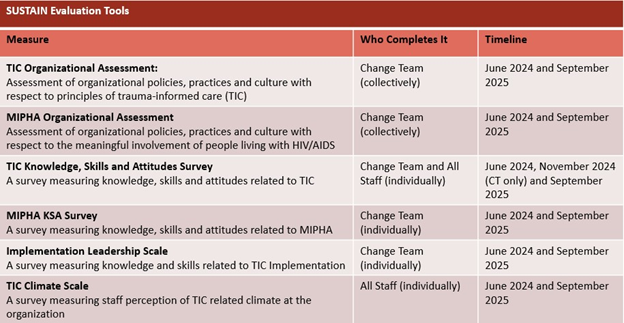Login to Complete an Application or to Access Judging Panel

Background
The SUSTAIN Wellbeing COMPASS Coordinating Center (SUSTAIN) aims to strengthen organizational capacity in the intersections of HIV, wellbeing, mental health, substance use, trauma-informed care, and telehealth through community-centered grants, training, consultation, and coaching. Organizations need the resources to plan, create, expand, implement, and evaluate much-needed programs and projects. SUSTAIN works with organizations to build the capacity to provide Southern communities with high-quality, affirming, and culturally responsive care.
The landscape of HIV has been stagnant, in part, because organizations often do not have the support or resources to engage in meaningful structural change required to end the HIV epidemic. This lack of support and resources ultimately trickles down to harm the communities they serve and their staff. The SUSTAIN team believes that organizational change is key to life-saving transformative change.
The SUSTAIN COMPASS Coordinating Center envisions a world where organizations have the tools to address multilevel trauma to transform organizational culture and practices. We believe these transformative changes will enhance the well-being of people living with HIV and truly end the HIV epidemic.
To achieve this goal, this request for proposals (RFP) will fund organizations to plan and implement changes to their organizational cultures, practices, processes, and systems (structural changes) to be trauma-informed. (Graphic below). Trauma-informed approaches can be applied to all our content areas (wellness, mental health, substance use, and telehealth) and their intersection with HIV.
Content Area
Wellbeing, Mental Health, Substance Use, Trauma-Informed Care, and Telehealth
“Approach Matters: Trauma-Informed Care Organizational Change Initiative”
What is Organizational Change?
Organizational change refers to actions that transform culture, infrastructure, and internal processes, such as hiring, training, screening practices, and policies and procedures. Organizational change requires intentionality, commitment, and management to bring about successful change. The organizational change process typically includes three major phases: pre-implementation, implementation, and sustainability. We know that organizational change is not easy; however, organizations must succeed and grow. Furthermore, there are benefits to organizational change, such as employee development, employee engagement, employee retention, service user satisfaction, service engagement, or service innovation or enhancements.
Why focus on Trauma-Informed Organizational Change?
Trauma, stigma, and adversity for those living with and most impacted by HIV have been continued concerns that need to be addressed. Trauma, just like most life experiences, does not happen in a vacuum and manifests at different levels of society, organizations, and personal life. Trauma impacts all aspects of a person, including their physical and mental health, behaviors, and attitudes toward seeking care. Using trauma-informed approaches in all aspects of the organization and its service provision is critical to ending the HIV epidemic. Trauma-Informed Organizational Change requires examination, analysis, and changing how power is distributed and decisions are made. One of the most significant goals of trauma-informed organizational change is to develop a culture of collaboration, choice, and transparency.
Trauma-informed care has been found to promote healing for staff and those being served. Becoming a trauma-informed organization is an everlasting journey rather than a destination that will require lots of work, personally and professionally. This means the organization will forever be engaging in this work of becoming trauma-informed.
The Six Guiding Principles to a Trauma-Informed Approach

What Type of Organization are We Looking For?
We seek organizations who want to embark on this journey. SUSTAIN acknowledges that trauma-informed organizational change can look different from organization to organization, from changes in mission/vision, practices, or policies and procedures. The ultimate goal of trauma-informed organizational change is to not only recognize the effect of trauma on clients/patients/staff but also the impact on the workforce based on their own and others’ experiences of trauma and/or adversity.
Below are details to reflect upon and include when completing your proposal, particularly in the narrative of the proposal:
- Centering Communities: We are interested in proposals that our and/or centers lead in the following communities:
- Black and Latinx communities of transgender and non-binary experiences
- Black same-gender-loving men, gay, bisexual, and queer men
- Latinx communities
- Cisgender Black women
- Organizational Change: We encourage innovative, out-of-the-box, programs that build organizational capacity around SUSTAIN’s content areas and move the needle on social and structural conditions, such as policies, organizational culture, physical environment, norms, attitudes, beliefs, and culture.
- What experience does your organization have, if any, with organizational change?
- What are the goals of your trauma-informed organizational change?
- What are some anticipated facilitators and barriers of your organization conducting this trauma-informed organization change?
- MIPA: The inclusion of Meaningful Involvement of People Living with HIV/AIDS (MIPA) in Action is essential in your proposal and must be intentionally and thoughtfully integrated into ALL aspects of your proposal.
- MIPA in Action is the meaningful and intentional involvement of individuals living with HIV/AIDS in all aspects of an organization, including but not limited to program/project conceptualization, planning, implementation, evaluation, and dissemination. Be specific in how your organization meaningfully involves people living with HIV and how you intend to do so in this project.
- What positions do people living with HIV/AIDS hold in your organization? What positions will they hold in this proposed program?
- How is your organization including people living with HIV/AIDS at all levels of decision-making? How will they be included as decision-makers in this proposed program?
- How do you plan to involve people living with HIV/AIDS in your proposed program and the development of this proposal? Please be as specific and detailed as possible in your proposal and the budget.
- MIPA in Action is the meaningful and intentional involvement of individuals living with HIV/AIDS in all aspects of an organization, including but not limited to program/project conceptualization, planning, implementation, evaluation, and dissemination. Be specific in how your organization meaningfully involves people living with HIV and how you intend to do so in this project.
- Racial Justice: The Inclusion of Racial Justice is essential in your proposal:
- Racial justice is the active involvement of learning and understanding to make actionable and measurable steps to achieve fairness, equity, and justice for the racial marginalized, particularly Black people, to give them what they need to enjoy full, healthy lives. There is an interconnected relationship between racism, anti-Blackness, systems of oppression, and HIV. These same racist and anti-Black policies, systems, and practices have shaped organizational practices and stripped funding away from Black-led organizations. They have historically limited access to physical and mental health care access for Black people living with HIV. These anti-Black and white supremacist policies continue to impede Black communities' overall wellness and advancements in liberation.
- What positions do Black communities hold in your organization?
- What leadership - management or other decision-making - positions do Black individuals hold in your organization?
- What is the percentage for each population group?
- What practices and policies do you have in place to support trans and gender non-conforming staff and communities you serve?
- How are Black and Latinx individuals represented on your Board of Directors?
- What is the percentage of directors for each population group?
- To what extent does your organization include a racial justice or equity lens or approach to your work?
- Racial justice is the active involvement of learning and understanding to make actionable and measurable steps to achieve fairness, equity, and justice for the racial marginalized, particularly Black people, to give them what they need to enjoy full, healthy lives. There is an interconnected relationship between racism, anti-Blackness, systems of oppression, and HIV. These same racist and anti-Black policies, systems, and practices have shaped organizational practices and stripped funding away from Black-led organizations. They have historically limited access to physical and mental health care access for Black people living with HIV. These anti-Black and white supremacist policies continue to impede Black communities' overall wellness and advancements in liberation.
Please check out our videos about the RFP and what previously funded organizations are discussing their projects on our YouTube page.
Roadmap of the Organizational Change Initiative:

Tips for Successful Implementation of this Initiative
Below is a visual representation of how the work plan narrative and work plan template should flow. Please consider the following questions for each phase. These will help guide the development of your work plan:

Time Commitment
This initiative is a journey, not a sprint. It will require 150 - 200 hours to be dedicated to this project SOLELY, with over 100 hours taking place within the first six (6) months of the project's start date. Therefore, the budget reflects what is needed to carry out this project.
Rest Assured – you are not in this alone! Also, you will have SUSTAIN Consultants, your Project Officer, Advocacy Group, SUSTAIN Advocacy Group, and others to assist along this journey!
Change Team Deeper Dive
The information below explains the Change Team composition, roles, and responsibilities. Please review it in great detail.
Change Team Composition with Responsibilities

Role of Change Team
Change Team Lead will:
- Oversee and lead the change team process
- Ensure all members are on the trainings
- Ensure the team is developing the advocacy group process
- Ensure the work plan is developed
Additional Advocacy Group Information
- Must be a 3-6 member team, with two (2) being identified in the proposal and already agreed to participate
- Assist with recruiting an additional 1-4 members
- Must reflect the population/communities your organization serves to complete this group and openly living with HIV
The Advocacy Group Team Members will be responsible for assisting the organization to foster an environment in which all individuals seeking services feel empowered, included, and acknowledged without causing re-traumatization or harm.
The Advocacy Group Team Members will work with the Organizational Champions leads to provide insight, guidance, and support to the organization. The organization will work collaboratively with the Advocacy Group Team Members to lift up valuable lived experiences and make decisions regarding adjustments within the different levels of the organization to create sustainable and lasting change.
SUSTAIN Budget Requirements
The budget line items and accompanying mandatory allocations for this project are below:
Required Items
The total budget will be $130,000 in direct funding to be allocated as follows:
- Budget to offset travel costs for mandatory meetings - $8,000
- 2 Change Team Champions must be at 1.0 FTE and dedicated to this initiative to develop, oversee, and manage this program and work on evaluation tasks. They are required to dedicate 1.0 FTE total to this initiative (Effort split of the 1.0 FTE to be determined by the organization) - $65,000
- Advocacy Group - MIPA in Action - $45,000
- Indirect Cost/Overhead - $10,000
- For organizational discretion (you can increase any of the previously proposed items or create new items [i.e., technology, printing, etc.]) - $2,000
- Consultancy and trainings - You will have to utilize the SUSTAIN-provided consultants. SUSTAIN will pay the consultant directly, and it does not come out of your direct funding budget
Allowable Expenses
- Direct program expenses, including but not limited to the following: personnel expenses, consultant costs, fringe benefits, and travel to implement the proposed project
- Trainings, consultations, and conferences relevant to project completion
- Pilot and demonstration projects
- Public health capacity building
- Policy and statistical analysis in line with programmatic goals
- Strategic communications, including public/patient education
- Community engagement and coalition-building
- Program research and evaluation
- Indirect expenses of up to $10,000 of the proposed budget.
Evaluation
There will be two levels of evaluation. The first level occurs within the COMPASS Coordinating Centers (CCs) to assess the success of individually funded programs. It will be led by the respective Coordinating Center, in this case, SUSTAIN Level Evaluation. The second level, called Centralized Evaluation, will be led by ETR, the COMPASS external evaluation partner who will assess the overall success of the Coordinating Centers. Funded community partners are expected to collaborate on and participate in assessments with the Coordinating Centers and ETR to support the COMPASS evaluation efforts.
SUSTAIN Level Evaluation
SUSTAIN values rigorous evaluation of its work and the work of grant partners. Evaluation helps us learn from project implementation, develop organizational capacity, enhance community accountability, and identify effective practices.
Please review the image below as the tentative timeline for SUSTAIN-level evaluation:

Centralized Evaluation
Gilead Sciences and the CCs have partnered with ETR to serve as the COMPASS external evaluator to facilitate continuous improvement through establishing data-driven programming, monitoring, and evaluation systems. ETR is a non-profit organization that advances health equity by designing science-based solutions and brings nearly four decades of experience in HIV, Sexual and Reproductive Health, youth, and families. ETR may contact funded organizations throughout the funding initiative (https://www.etr.org/).
Funding community partners are expected to participate in assessments and routine (tentatively quarterly) data collection (survey links via Qualtrics) with the CCs to support the COMPASS evaluation efforts. ETR collaborates with the CCs to collect evaluation data from COMPASS community partners.
Detailed roles and responsibilities for ETR include:
- Developing, implementing, and tracking core metrics for COMPASS
- Establishing monitoring and evaluation systems for the collection, analysis, and routine reporting of key evaluation data
- Supporting the development of tools and processes to communicate overall COMPASS impact to key stakeholders
- Reporting outcomes and recommendations necessary for continuously improving programs and data collection
Please review the general RFP for more details about the additional evaluation information and requirements for ETR.
Application and Rubric Information
CLICK HERE to view a description of these various components, the number of points weighted in the overall score of your application, and other details.
References
BEAM. Healing Justice. Retrieved from: http://www.beam.community/healing-justice
Centers for Disease Control and Prevention (CDC). (2019). HIV in the Southern United States. CDC Issue Brief. https://www.cdc.gov/hiv/pdf/policies/cdc-hiv-in-the-south-issue brief.pdf
Coyle, R. P., Schneck, C. D., Morrow, M., Coleman, S. S., Gardner, E. M., Zheng, J. H., ... & Anderson, P. L. (2019). Engagement in Mental Health Care is Associated with Higher Cumulative Drug Exposure and Adherence to Antiretroviral Therapy. AIDS and Behavior, 1-10.
Mellins, C. A., Havens, J. F., McDonnell, C., Lichtenstein, C., Uldall, K., Chesney, M., Bell, J. (2009). Adherence to antiretroviral medications and medical care in HIV-infected adults diagnosed with mental and substance abuse disorders. AIDS care, 21(2), 168–177. doi:10.1080/09540120802001705
National Institute of Mental Health (NIMH). (2017). Mental Illness. Retrieved from https://www.nimh.nih.gov/health/statistics/mental-illness.shtml#part_154910.
RAND Health. (2018). HIV Cost and Services Utilization Study (HCSUS) Key Findings. Retrieved from https://www.rand.org/health/projects/hiv/HCSUS-findings.html
View the PDF version of the application HERE.
Click to return to the Home Page.
